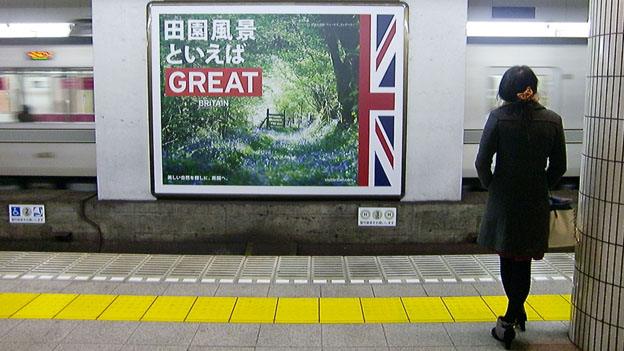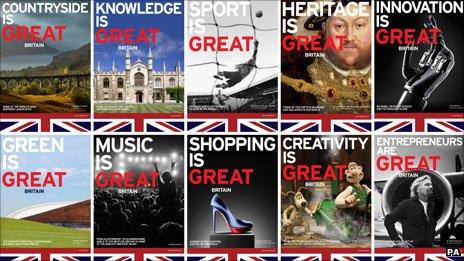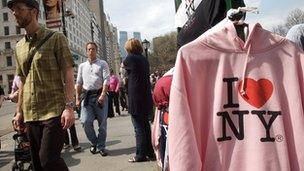London 2012: Will GB reap ‘great’ tourism rewards?
- Published

Organisers hope the GREAT campaign will be seen by Tube-riders in Tokyo and bus-riders in Berlin
A multi-million pound international campaign has been launched to entice visitors to the UK. But with the Olympic Games expected to draw the attention of four billion global viewers, is this marketing push money well spent?
The dramatic Brecon Beacons, mystical Stonehenge, bonnie Glenfinnan - just a few of the scenic landscapes that are being slapped across the New York subway, draped over Berlin buses, plastered onto the Paris Metro and promoted in 11 other cities around the world.
It's the latest wave of GREAT - Britain's biggest ever tourism campaign - which is costing the UK government £125m and aims to attract 4.6 million more visitors, £2.3bn in additional visitor-spend, and £1bn of extra investment over the next four years.
Some £25m is being allocated to the new campaign.
Organisers say the drive is about converting the anticipated feel-good factor of London 2012 and the Queen's Diamond Jubilee into actual visits to Britain, thereby creating "a solid tourism legacy".
But some question whether Britain needs the extra publicity, particularly when billions of eyeballs will be fixed on London and various other British cities in July and August.
Stryker McGuire, the US journalist behind the Newsweek article credited with sparking the "Cool Britannia" phenomenon, external in 1996, thinks the UK is so well known it does not need to have an awareness-raising campaign.
"When you advertise Britain in these big cities, you are preaching to the converted," he said.
In the 1990s, he said, people were surprised by London, its music and its diversity but now it was not as "fresh".
"Just the fact of having the Olympics gives Britain all the publicity it needs," said Mr McGuire, now the London-based senior editor of Bloomberg Markets magazine.
"If you were budget-conscious you'd have to ask whether £25m could have been better spent elsewhere."
'Caught up in the Games'
Evidence from previous Olympic host cities suggest cashing in on the Games is no easy task.
In Greece, even before the current economic crisis, Athens struggled to pay off its £9.4bn splurge on the 2004 Olympics. The country was crippled by debt and its venues lay abandoned, external.
Atlanta 1996's legacy, while positive in regenerating the city's downtown area, has been marred by transport issues that blighted the Games.
Beijing did not see an immediate surge in hotel bookings, external despite hopes that hosting the 2008 Olympics would open China up to a wider tourist market.
Barcelona 1992 has been heralded for transforming the coastal city, external into one of Europe's most popular tourist destinations, but even its tourism trade suffered, external in the aftermath of the Olympics.
And organisers of Sydney 2000, one of the most successful modern Games, accept they did not plan enough for the years that followed.
Sue Holliday, Sydney 2000's chief planner, told the BBC: "Everyone gets so caught up in focusing on the Games and forget about what happens afterwards - is there a post-Olympic plan for business, people and legacy in the region?"
Secretary of State for Culture, Olympics, Media and Sport Jeremy Hunt accepted that hosting the Olympics did not guarantee a tourism boost, and instead cited Vancouver's Winter Olympics in 2010 and Germany's 2006 World Cup as examples of countries capitalising on sporting events from a tourism perspective.
"The name of the game is to convert interest in the UK into a decision to commit to coming on holiday here," he said at the launch of GREAT's £25m visibility campaign on Thursday.
"We are taking the fight for the tourist pound right to our competitors' doorsteps, with a sales assault on the 14 biggest and most lucrative tourism markets around the world... There will be no escape from the message that Britain is great."
'No guaranteed boost'
Experts such as the European Tour Operators Association (ETOA) cite evidence of a tourism offset from the Olympics - where would-be visitors are "scared away" by the extra expense and inconvenience associated with the Games.
Games spectators are thought to spend less money on non-Olympic activities than regular tourists, according to an ETOA report, external.
And there are concerns domestic day-trippers may put international non-Olympic tourists off.
"The Olympics doesn't guarantee a boost for tourism in the host city," said Dr Steve Musson, a lecturer in Human Geography at the University of Reading.
"The Diamond Jubilee and the Olympics are a good opportunity to promote Britain to tourists during 2012, but evidence shows large events can disrupt normal tourism patterns."
The GREAT campaign aims to buck that trend, with a number of profile-raising events since it was launched by Prime Minister David Cameron last September.

Previous posters celebrated diverse British GREATness, from Henry VIII, to shopping and the creativity behind Wallace and Gromit
While organisers hope London 2012's economic impact will be one of its main legacies, bringing £1bn of extra business over four years, some question the mixed message being projected by the GREAT campaign.
Earlier posters have featured Henry VIII and entrepreneur Richard Branson, juxtaposing Britain's modernity and tradition.
"The image of history being portrayed is viewed by some as being typically outdated and arrogant 'Britishness'," said Simon Chadwick, professor of Business Marketing and Sport at Coventry University.
"Whereas the sense of modernity is seen as being unconvincing, with other countries around the world having a much stronger identity of dynamism and progression."

The 'I (heart) NY' campaign has been promoting New York City since the 1970s
The latest campaign's bucolic message touting Britain's countryside and cultural credentials will reach cinema-goers in Sydney and bus-riders in Berlin, but can you manufacture a zeitgeist?
Mr Hunt and VisitBritain's Chief Executive Sandie Dawe insisted GREAT was not about rebranding Britain. Referring to 'Cool Britannia', Ms Dawe said the new initiative was about warming up the British welcome "so it's not cool, it's warm - and we want it to be hot".
Projecting what was great about Britain to 90m people in key global economic powerhouse cities would make them think about visiting it on their next holiday, she added. That would boost a tourism intake that already contributes £17bn in foreign exchange to the UK economy each year.
But Dave Trott, who worked on the "Enjoy England" campaign in 2009, compared GREAT to the "I (heart) NY" phenomenon that successfully rebranded New York in the 1970s.
"People were buying the T-shirts and doing their advertising for them - millions and millions of pounds of media for free," said Mr Trott, executive creative director for CST The Gate advertising agency.
"That's how you do it. That was [acclaimed graphic designer] Milton Glaser, not a committee of government people."
- Published22 September 2011
- Published22 September 2011